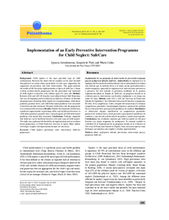Abstract
Background: Child neglect is the most prevalent type of child maltreatment. Research has shown that its sequelae can be more harmful than physical or sexual abuse, particularly at early ages, supporting the importance of preventive and early interventions. This paper presents the results of the first pilot implementation in Spain of SafeCare, a home visiting evidence-based programme for the prevention and treatment of child neglect in families with children aged 0-5 years old.
Method: Between 2014 and 2017, 89 families were referred from Child Protection Services of Gipuzkoa and San Sebastian to SafeCare. Of these, 46 finished the programme. Parenting skills, depressive symptomatology, child abuse potential, parental stress, and child behavioural problems were measured at baseline and after treatment. Parental satisfaction with the programme was evaluated after treatment.
Results: High levels of parental satisfaction, significant improvements in parenting skills, and signifi cant decreases in child abuse potential, parental stress, and perception of child behavioural problems were found after treatment.
Conclusions: Findings suggested that SafeCare can be useful for families with early signs of child neglect. The study also confi rmed the feasibility of implementing such an evidence based programme in Child Protective Services in Spain. More studies with larger samples and experimental designs are necessary.

